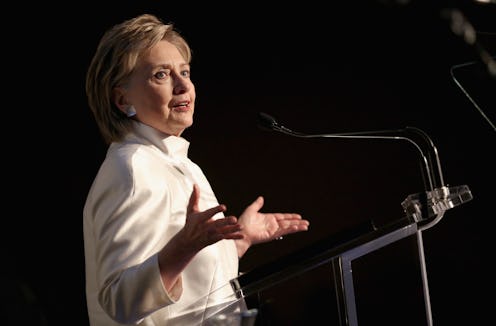Books
What Hillary Clinton Thinks "Has To Be Said" About Sexism During Her Campaign

Hillary Clinton's memoir What Happened has finally hit the shelves. And as has been widely talked about for months leading up to its release, Clinton is taking a look at the many different aspect of her ill-fated 2016 campaign for the presidency, and dissecting her shocking loss from multiple angles. One of the biggest discussions both during Clinton's campaign and her subsequent loss was the blatant misogyny on display. Yes, there was Trump's own abhorrent admission of sexual assault, and his attempt to intimidate Clinton during the debates by following her around the small stage (to which Clinton reveals she wanted to say, "Back up, you creep!")
But ultimately, the issue went far beyond Trump, too. The effects of widespread toxic masculinity and traditional patriarchal ideologies that have run rampant in the U.S. (and, really, throughout the world) followed Clinton around the campaign trail like a dark cloud. Even before she announced her candidacy there were thinkpieces floating around the internet and television news about Clinton, and in general, women, being unfit for office ("But she has a grandchild!" or "But she probably has emotions!") and it only got worse during the course of the campaign.
Who can forget the media frenzy that Clinton's working while sick with pneumonia caused, despite the fact that it did nothing more than show her commitment to her work, and Trump had not released his medical results to the media at all? And what about the dismissals seen in Trump supporters t-shirts calling for Clinton to be thrown in jail, using language that was disgustingly anti-women and ultimately violent?
Well, if you were expecting Clinton to ignore that sexism in What Happened, you would be very, very wrong. In fact, she's got a lot to say about how misogyny and sexism helped keep her out of office...and how the problems it creates goes far beyond just one woman, or one campaign.
"This has to be said: sexism and misogyny played a role in the 2016 presidential election. Exhibit A is that the the flagrantly sexist candidate won. A whole lot of people listened to the tape of him bragging about sexually assaulting women, shrugged, and said, 'He still gets my vote,'" Clinton writes. "But Donald Trump didn't invent sexism. And its impact on politics goes far beyond this one election."
"But Donald Trump didn't invent sexism," Clinton writes. "And its impact on politics goes far beyond this one election."
Clinton goes on to define the differences between sexism and misogyny, writing, "Sexism is all the little ways society draws a box around women and says, 'You stay in there.' Don't complain because nice girls don't do that. Don't try to be something women shouldn't be. Don't wear that, don't go there, don't think that, don't earn too much." But misogyny, she says, "is something darker."
"It's rage. Disgust. Hatred. It's what happens when a woman turns down a guy at a bar and he switches from charming to scary. Or when a woman gets a job that a man wanted and instead of shaking her hand and wishing her well, he calls her a bitch and and vows to do everything he can to make sure she fails," Clinton writes.
"[Misogyny is] rage. Disgust. Hatred. It's what happens when a woman turns down a guy at a bar and he switches from charming to scary. Or when a woman gets a job that a man wanted and instead of shaking her hand and wishing her well, he calls her a bitch and and vows to do everything he can to make sure she fails."
Of course, this is abundantly familiar to any woman who has ever tried to further her career, or break into a field dominated by men, or even, as Clinton writes, "voice a political opinion or even just share an anecdote from her own lived experience" on Twitter on YouTube. And while it's crucial that Clinton take a hard stance on the sexism and misogyny she has endured throughout her political career, we can only hope that her insistence on not backing down will inspire other women to do the same.
"...I passionately believe that the only way we're going to get sexism out of politics is by getting more women into politics," Clinton writes.
Consider this your call to battle, future Madam Presidents.